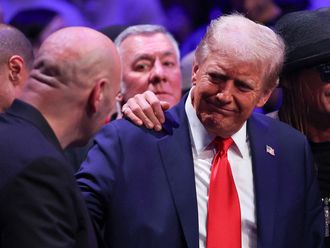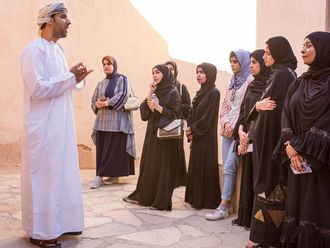A wind of change is sweeping through Egypt, Tunisia and across the Arab world. The causes are many; the situation in many countries is volatile; and the long-term implications are hard to predict.
Few, if any of us, had predicted such momentous developments only a few weeks ago — and I can understand that many in the region have concerns about instability. But as an alliance of democratic nations, we believe that the right way forward is to answer the legitimate aspirations of the people through peaceful transition to democratic reforms without delay.
That is the way to build genuine, long-lasting stability. And that is in the interest of all our nations, because security in the broader Middle East is of importance far beyond the region.
Our security is intertwined. It is precisely for that reason that I and the entire Nato Council have come to Qatar. At a major conference in Doha starting today, we will meet with representatives of the four Gulf countries who, together with Nato, form the Istanbul Cooperation Initiative (ICI) — Bahrain, Kuwait, Qatar and the UAE — to discuss how we can boost our partnership, and extend it to other countries in the region. The Conference will also be attended by representatives from Oman and Saudi Arabia.
The Nato representatives look forward to hearing the views of these countries, which have a standing invitation to join the ICI.
We must approach these discussions with our eyes open. Back in 2004, the ICI got off to a very promising start. But in recent years, it has proven more difficult to intensify our practical cooperation. Frankly speaking, we have not come close to meeting the potential of our partnership.
The time has come to re-energise this partnership. Because the need for us to cooperate has only grown.
Technological progress and globalisation have made countries increasingly interdependent. We face common threats — terrorism, cyber attacks, the proliferation of weapons of mass destruction, piracy and the disruption of energy flows on which our nations depend.
At our summit meeting in Lisbon last November, Nato's 28 Allies agreed a new Strategic Concept, an agenda for the next decade. It marks a step change in the Alliance's approach to these new and emerging threats. And it places particular emphasis on the need for Nato to work more closely with other nations and organisations to find common solutions.
I see a number of opportunities to bring fresh momentum, scope and substance to our partnership in the Istanbul Cooperation Initiative.
First of all, I hope that we can intensify our political consultations. There are many security issues of common concern. By discussing them more regularly and openly — both on a bilateral and a multilateral basis — we can develop a common understanding and promote common solutions.
We should also enhance our practical cooperation. Nato plans to fully open its tool-box of cooperation activities to all its partners. That will give our ICI partners a range of interesting new opportunities in areas such as military-to-military cooperation, intelligence sharing and border security.
We can also do more together on energy security. With 50 per cent of the world's energy supplies transiting through the Gulf region, this is an obvious shared interest. The Alliance stands ready to work together with its ICI partners to identify the best and most efficient ways to develop projects in this area.
The proliferation of weapons of mass destruction is a real and growing threat to all of us. We know that it is of particular concern to our ICI partners, and we are open to holding discussions with them on this issue to explore more focused and practical cooperation.
In times of turmoil, you can rely on established partnerships. They must be based on a shared recognition of common interests, but also a shared determination to pursue those common interests together.
Given the increasingly complex security threats of the 21st century, I believe there is every reason for Nato and its ICI partners to deepen our partnership.
The Doha conference will, I hope, prove a turning point in making that happen.
Anders Fogh Rasmussen is the Nato Secretary General









